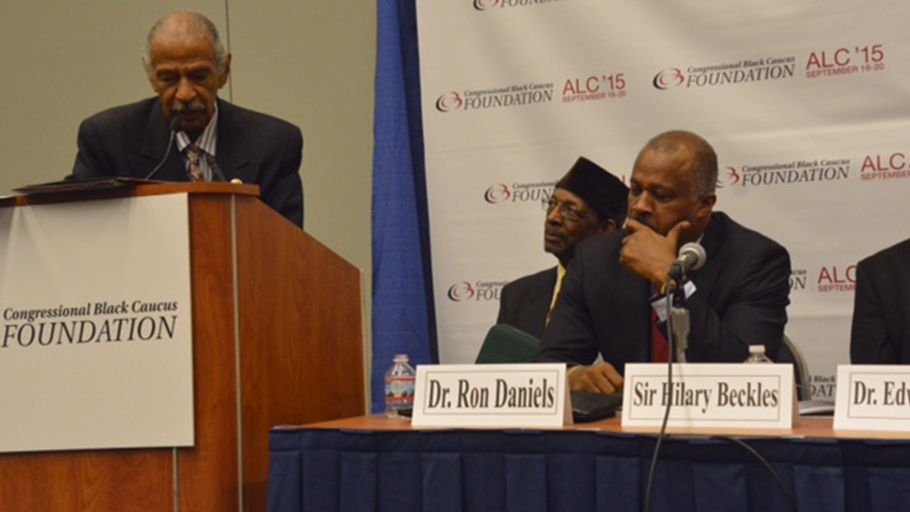The National African American Reparations Commission (NAARC) Rolls Out Preliminary 10-Point Reparations Plan at Congressional Black Caucus Conference, 2015
Cong. John Conyers of Detroit, honorable host of the CBC’s Reparations Braintrust and author of HR40 welcomes members of the NAARC and Chairman of the CARICOM Reparations Commission Prof. Sir Hilary Beckles.

NAARC’s Preliminary 10 Point Reparations Program
A Document for Review, Revision and Adoption as a Platform to Guide the Struggle for Reparations for People of African Descent in the U.S.
Quick Links:
- Download/Print 10 Point Reparations Program Booklet (PDF)
- The Preamble
- 1. A Formal Apology and Establishment of a MAAFA/African Holocaust Institute
- 2. The Right of Repatriation and Creation of an African Knowledge Program
- 3. The Right to Land for Social and Economic Development
- 4. Funds for Cooperative Enterprises and Socially Responsible Entrepreneurial Development
- 5. Resources for the Health, Wellness and Healing of Black Families and Communities
- 6. Education for Community Development and Empowerment
- 7. Affordable Housing for Healthy Black Communities and Wealth Generation
- 8. Strengthening Black America’s Information and Communications Infrastructure
- 9. Preserving Black Sacred Sites and Monuments
- 10. Repairing the Damages of the “Criminal Injustice System”
- The Call to Action and Healing
- Video from 2015 Congressional Black Caucus Conference
Preamble
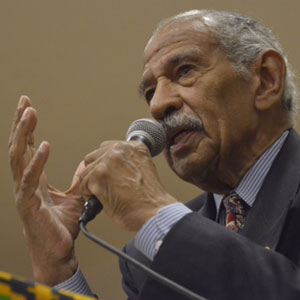
Cong. John Conyers
No amount of material resources or monetary compensation can ever be sufficient restitution for the spiritual, mental, cultural and physical damages inflicted on Africans by centuries of the MAAFA, the holocaust of enslavement and the institution of chattel slavery. These crimes against Black humanity, as affirmed by the Durban Declaration and Program of Action, were responsible for the death of millions of Africans who were ripped from their families and nations to labor for the enrichment of industries, commercial and financial institutions and individuals in Europe and the United States. In large measure the wealth of the new American nation was accumulated from the centuries of free labor, brutally extracted from enslaved Africans. With the “abolition” of slavery the “emancipated” sons and daughters of Africa suffered systematic, often violent repression, oppression, exploitation and deprivation under southern apartheid and de facto segregation in every region of this nation.
A political and economic system infected with white supremacy and structural/institutional racism persisted in retarding the dreams and aspirations of a people courageously striving to sustain families, build institutions and create healthy communities in a hostile land. The devastating damages of enslavement and systems of apartheid and de facto segregation spanned generations to negatively affect the collective well being of Africans in America to this very moment. Indeed, despite the civil rights/human rights “gains” achieved by the Black Freedom Struggle, the crises that continue to plague millions of Black people are incontrovertible proof that the disease of white supremacy still permeates the socio-economic and political culture, structures, institutions and systems of this society.
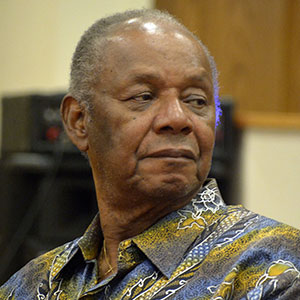
Bill Lucy, veteran labor leader.
The fulfillment of a “more perfect union” is not possible without an unequivocal acknowledgement of/ and unqualified apology for the “original sins” committed by the European colonialists in brutally, dispossessing the Native people of their lands and the horrific enslavement of Africans to be the economic lifeblood of the “American nation;” a nation conceived to be a “White man’s land.” A more perfect union must be predicated on a new covenant which acknowledges the crimes against humanity committed by European colonialists, the “founding fathers” of this nation and their progeny, and the granting of reparations as restitution to repair and heal the damages done to Native people and Africans.
As a matter of principle, each aggrieved, affected, and offended people must speak for themselves. On behalf of our African ancestors and succeeding generations of unsung heroes and heroines who have historically kept the fight for reparations alive up until the present, which includes the following:
- General Sherman’s Field Order #15 and the promises of 40 acres
- The National Exslave Mutual Relief Bounty and Pension Association led by Sister Callie House
- The Universal Negro Improvement Association / UNIA under the leadership of the Honorable Marcus Mosiah Garvey
- The Nation of Islam under the leadership of the Honorable Elijah Muhammad
- Queen Mother Moore and her Reparations Committee of Descendants of United States Slaves, Inc.
- The Republic of New Africa / RNA and Dr. Imari Obadele
- James Forman and his Black Manifesto reparations demands
- The National Coalition of Reparations for Blacks in America / N`COBRA
- Reparations activist, “Reparations Ray” Jenkins
- Congressman John Conyers
- Massachusetts State Senator Bill Owens
- Malcolm X
- The National Black United Front / NBUF and the December 12th Movement that mobilized the Durban 400
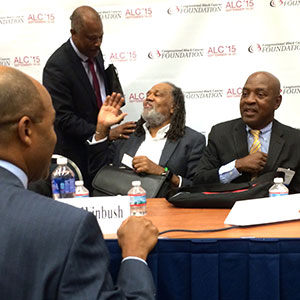
Sir Hilary Beckles, Dr. Raymond Winbush and Prof. Charles Ogletree
Therefore, the National African American Reparations Commission (NAARC) demands that the government of this nation acknowledge the unspeakable crimes committed against African people through enslavement, the institution of chattel slavery, systems of de jure and de facto segregation and other processes of discrimination, denial and exclusion which have severely damaged Black people across generations. We further declare our intent to relentlessly pursue local and state governments and private institutions directly engaged with or complicit in these crimes.
Pursuant to the fulfillment of this historic mission, the National African American Commission, in consultation with broad representation of the Reparations Movement in America, will establish a National Reparations Trust Authority to be the repository, custodian and administrative body to receive monetary and material resources, allocated by offending parties as restitution to repair the damages inflicted on the sons and daughters of Africans in America during centuries of oppression and exploitation. The National Reparations Trust Authority will be comprised of a cross-section of credible representatives of reparations, civil rights, human rights, labor, faith, educational, civic and fraternal organizations and institutions. It will be empowered to establish subsidiary Trust Funds to administer projects and initiatives in the areas of culture, economic development, education, health and other fields as deemed appropriate based on the demands in this Reparations Program. While the National Reparations Trust Fund is envisioned as a consensus mechanism for the repository of various forms of restitution, NAARC recognizes and respects the right of other Black organizations or agencies to pursue such compensation at the local, state and national level as well.
We are resolved to educate, mobilize and organize African people and all people of conscience and goodwill to compel this nation to acknowledge and apologize for the wrongs of the past and present and to provide the massive resources required to begin the process of repair and healing. Therefore, we advance a comprehensive program for reparatory justice:
1.
A Formal Apology and Establishment of a MAAFA/African Holocaust Institute
A. We demand a formal apology for the role the United States Government played by explicitly and implicitly participating in, encouraging and sanctioning the European Slave Trade and the institution of Chattel Slavery. The apology should be initiated by the President and ratified by the U.S. Congress by roll-call vote.
B. Furthermore, the apology should be accompanied by the establishment of a permanent MAAFA/African Holocaust Institute, charged with providing public education on the origins of enslavement, the role of private and public institutions in initiating and sustaining it; the systems of legal and de facto segregation enacted post-“emancipation” to the present; the damages/harm inflicted on people individually and collectively; and, the wealth and benefits to local, state and the federal government, private institutions and White society in general, derived from these white supremacist institutions and structurally racist policies and practices.
Back to top ↑
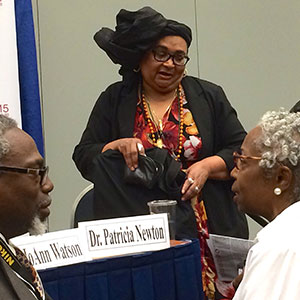
Dr. Patricia Newton
2.
The Right of Repatriation and Creation of an African Knowledge Program
A. The descendants of the millions of Africans who were stolen from Africa and transported to the strange lands of the “Americas” against their will to enrich their captors have a right to return to the motherland to an African nation of their choice. Africans in America who choose to exercise the right to return will be provided with sufficient monetary resources to become productive citizens in their new home and shall be aided in their resettlement by a Black controlled agency funded by the federal government to perform this function.
B. The Repatriation Program will be complemented by an African Knowledge Program similar to the one included in the CARICOM Reparations Commissions’ Ten Point Program of Reparatory Justice. This Program will serve to bridge the barriers and heal the wounds between Africans in the U.S. and Africans on the continent, resulting from centuries of enslavement, cultural alienation, misinformation and divide and conquer/exploit schemes initiated by European and American slave traders, colonialists and neo-colonialists. Emotional Emancipation Healing Circles, research missions and cultural/ educational exchanges to build “bridges of belonging” will be part of such a Program.
Back to top ↑
3.
The Right to Land for Social and Economic Development
After centuries of free labor that fueled the commercial and industrial revolutions in the U.S., enriched those at the helm of capital and finance and created opportunities and a sense of privilege” for Europeans of every socio-economic strata, enslaved Africans were “emancipated” without being granted a material stake in the form of land/resources, e.g., “40 acres and a mule,” to start anew in this hostile land. Moreover, formerly enslaved Africans were excluded from government programs like the Homestead Act which greatly benefited poor and working class Whites and corporations. Post-emancipation, land owned by Blacks was often stolen though trickery, fraud and discriminatory policies and practices. These policies and practices were rampant in the Department of Agriculture, especially as carried out by Agricultural Extension Agencies in the South. They drastically stunting the growth and led to the bankruptcy of untold numbers of Black farmers. Therefore we demand:
A. Substantial tracts of government/public land in the South and other regions of the country be transferred to the National Reparations Trust Authority with full autonomy in terms equivalent to the sovereignty granted to Native people over reservations awarded to them. These lands are to be utilized for major educational, commercial, industrial, economic/business and health/wellness institutions and enterprises to benefit people of African descent.
B. Funds to support the restoration and enhancement of agricultural development including, grants and loans to limited resource farmers to enable them to expand and compete in the U.S. and global economy.
Back to top ↑
4.
Funds for Cooperative Enterprises and Socially Responsible Entrepreneurial Development
Despite amazing efforts during the colonial, Revolutionary War, Civil War and post-emancipation eras to the present, historically the quest to build a viable and sustained Black business/economic infrastructure has been thwarted by Blacks being pushed out of sectors of the economy like carpentry, brick masonry, catering, tailoring and other crafts and skills, where they dominated in favor of Whites; the malicious destruction of thriving business districts like “Black Wall Street” in Tulsa and towns like Rosewood by White terrorist attacks; the systematic strangulation of Black towns like Hayti, North Carolina; Urban Renewal (“Negro removal”) programs that gutted Black business districts in numerous cities and towns; and discriminatory lending policies which denied Black businesses the capital needed to survive and develop on a competitive basis. Therefore we demand resources to support major Cooperative Enterprises and Socially Responsible Entrepreneurial Development:
A. Funds to develop an infrastructure of strategic financial, commercial, industrial, agricultural and technology-oriented business/economic enterprises for the benefit of Black America as a whole. These enterprises will be managed by Boards of Trustees appointed by the National Reparations Trust Authority.
B. Funds for the establishment of a Black Business Development Bank to provide grants and loans to socially responsible for-profit entrepreneurships/economic ventures, dedicated to building the Black community, utilizing just labor policies and sustainable environmental practices.
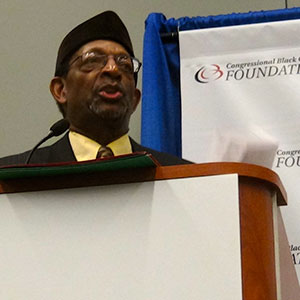
Dr. Ron Daniels, President of the Institute of Institute of the Black World 21st Century (IBW)
Back to top ↑
5.
Resources for the Health, Wellness and Healing of Black Families and Communities
The intergenerational psycho-cultural, mental, spiritual and physical damages of Post Traumatic Slavery Syndrome, the daily toll of racism on individuals, families and communities and the debilitating effects of chronic health disparities resulting from structural/institutional racism are well documented by leading Black psychiatrists, psychologists and physicians. Moreover, many public hospitals and medical facilities that traditionally served Black communities have either been forced to close or are ill-equipped to offer a full range of services for lack of adequate funding. Therefore we demand:
A. Funds for the establishment of a regional system of Black controlled Health and Wellness Centers, fully equipped with highly qualified personnel and the best 21st century facilities to offer culturally appropriate, holistic preventive, mental health and curative treatment services.
B. Funds to strengthen existing hospitals and medical centers serving Black communities, e.g., Harlem Hospital, Howard University Medical Center and the reopening of such institutions that previously served Black communities that closed due to lack of funds.
C. Funds to strengthen institutions like Meharry Medical College, and scholarships for students interested in attending these institutions who are committed to providing a period of service to Black communities.
D. Resources to fully operationalize and institutionalize the use of Emancipation Healing Circles as a methodology to address and overcome the damages of Post Traumatic Slavery Syndrome and racism as a disease infecting America’s culture and institutions.
The aforementioned Health and Wellness Programs are to be implemented in consultation with the National Medical Association, National Dental Association, National Association of Black Nurses, Black Psychiatrists of America, Association of Black Psychologists, Inc., All Healers Mental Health Alliance and similar organizations, institutions and agencies.
Back to top ↑
6.
Education for Community Development and Empowerment
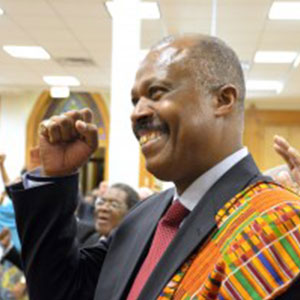
Sir Hilary Beckles
Africans in America have acquired knowledge, produced great inventors, built institutions and developed extraordinary leaders despite calculated efforts to deny Black people an education and/or the propagation of misinformation designed to destroy identity, self-esteem and instill obedience to an oppressive system. During enslavement Africans could be punished or even killed for learning to read. Post-emancipation the vast majority of Black young people have been confined to separate and severely under-resourced schools during legal and de facto segregation. These conditions prevail today in what is sometimes called “poor performing schools.” In higher education African Americans have courageously endeavored to build and maintain a system of Historically Black Colleges and Universities (HBCUs), many of which are struggling to survive. Therefore we demand:
A. The allocation of funds for the expansion and consolidation of the National Board of Education of African Ancestry as the body to devise standards and accredit African-Centered educational programming for predominantly Black public schools throughout the country.
B. The provision of monetary and material incentives by the Federal government to school districts which adopt and implement a “Curriculum of Inclusion” of the history and culture of people of African descent in the U.S.
C. Funds to strengthen Historically Black Colleges and Universities as the indispensable backbone of the higher educational infrastructure in Black America.
D. The funding of an endowment to provide free education for students attending HBCUs who are committed to providing service to Black communities.
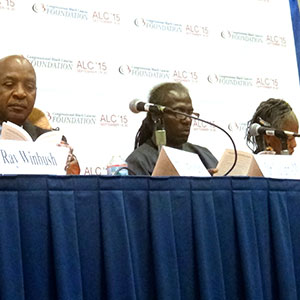
Prof Charles Ogletree, Kamm Howard and Dr. Iva Carruthers
Back to top ↑
7.
Affordable Housing for Healthy Black Communities and Wealth Generation
Historically people of African descent were denied equitable access to programs within agencies like the Federal Housing Administration (FHA) which White Americans utilized to create prosperous suburbs across the nation and create wealth that could be transferred inter-generationally. Blacks were often victimized by discriminatory covenants that restricted them to certain neighborhoods: “redlining” by banks which refused to make loans to individuals and businesses in targeted neighborhoods and most recently, sub-prime lending schemes which resulted in the loss of billions of dollars in wealth in the form of home equity. The persistence of these discriminatory policies and practices produced an intergenerational deficit in terms of wealth creation that has stunted the social and economic development in Black families and communities.
Therefore we demand the funding of an African American Housing and Finance Authority to:
A. Finance the planning and construction of holistic and sustainable “villages” with affordable housing and comprehensive cultural-educational, health and wellness, employment and economic services.
B. Function as a source of grants and loans for persons seeking affordable housing.
Back to top ↑
8.
Strengthening Black America’s Information and Communications Infrastructure
From the earliest days of the forced migration of Africans to these hostile shores, communications vehicles like the Black Press have been critical to the survival and development of Black communities. Black America’s information and communications infrastructure was built and survives despite operating in a hostile environment and the absence of substantial public and private resources, more readily available to White individual and corporate information/communication media. The most recent conglomeratization of electronic and print media with the blessing of the federal government has been particularly devastating to the maintenance of Black America’s information and communications infrastructure. Therefore we demand:
 A. An annual federal set-aside of advertising dollars to support Black owned newspapers and magazines and radio and television stations. These funds would be administered by the National Newspaper Publishers Association (NNPA) and National Association of Black Owned Broadcasters (NABOB) under the guidance of the Reparations Trust Authority.
A. An annual federal set-aside of advertising dollars to support Black owned newspapers and magazines and radio and television stations. These funds would be administered by the National Newspaper Publishers Association (NNPA) and National Association of Black Owned Broadcasters (NABOB) under the guidance of the Reparations Trust Authority.
B. Funding for a national non-profit, non-commercial newspaper, radio and television network dedicated exclusively to cultural-education, economic/business and civic engagement programming for the benefit of Black America.
Back to top ↑
9.
Preserving Black Sacred Sites and Monuments
The struggle for freedom, dignity, self-determination and community/national development is a saga of a people in a strange land resisting, surviving, maintaining families, building institutions and creating a future in the face of unspeakable oppression, exploitation, terror and violence. All across this land there are slave quarters, hundreds of sites where Black people were lynched, and locales where Black towns and institutions were destroyed. But, there are also Black burial grounds, Black towns, e.g. Nicodemus, Kansas, Mound Bayou, Mississippi, houses of worship, meeting halls, one-room schools and other significant institutions that speak to the triumphant quest of a determined people to create a new African community in this hostile land.
These Black Sacred Sites and Monuments must be preserved as permanent memorials to continuously inform and inspire future generations of people of African descent about this legacy of trials, tribulations and triumph and to remind America of the white supremacist terror employed to obstruct the path to freedom of African Americans.
Therefore we demand:
A. The federal government via the National Parks Service erect markers on every site where a Black person was lynched, where a massacre of Black people was committed and sites where Black towns or neighborhood were destroyed.
B. Funds for the preservation of Black Burial Grounds and other significant cultural/historical sites.
C. Funds to conduct research to identify previously unknown Black Sacred Sites and Monuments.
Back to top ↑
10.
Repairing the Damages of the “ Criminal Injustice System”
Ever since the forced arrival of enslaved Africans in the Americas, policing and penal policies and practices were enacted to discipline, control and acclimate Black people to systems of exploitation. The “Criminal Injustice System” which evolved was/is a direct extension and protector of the interests of the corporate and political elites in the U.S. From runaway slave patrols, vagrancy laws, chain gangs, the convict lease system to relentless police violence, killings and mass incarceration, racist policies and practices have decimated Black communities and severely constrained civil rights, human rights and the socio-economic and political aspirations of Black people. The “War on Drugs” with its attendant racially – biased policies and practices is the most recent manifestation of this longstanding war on Black people. It has disrupted millions of Black families and severely damaged Black communities across the country. The “criminal injustice system” has been a persistent source of resentment, resistance and rebellion by Black people. Apologies from elected officials, leaders and institutions responsible for fostering and benefiting politically from this unjust system are not sufficient. The damages to Black families and communities must be repaired.
Therefore, we demand:
A. Substantial resources to establish a Black controlled Agency for Returning Citizens:
- To fund Centers in Black communities nationwide to provide culturally appropriate counseling, career development services and job/employment training for formerly incarcerated persons.
- Provide grants to create entrepreneurial/business opportunities in communities damaged by mass incarceration.
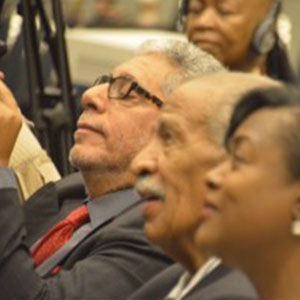
Don Rojas and Cong. John Conyers
B. Restoration of Voting Rights for all formerly incarcerated persons.
C. The exoneration of the Honorable Marcus Mosiah Garvey as the first victim of a “Cointelpro” type operation by J. Edgar Hoover’s FBI.
D. The release of all Political Prisoners and Prisoners of War unjustly convicted of acts of conscious committed resisting and defending Black people from an oppressive system.
E. Revising/amending the 13th Amendment to the Constitution, which formally abolished slavery, to delete the clause: “except as a punishment for crime whereof the party shall have been duly convicted, shall exist within the United States, or any place subject to their jurisdiction” – which implies that Black people convicted of crimes can be legally held in bondage.
Back to top ↑
The Call to Action and Healing
“We have come, over a way that with tears has been watered. We have come threading our path thro’ the blood of the slaughtered. Out of our gloomy past, till now we stand at last, where the white gleam of our bright star is cast.”
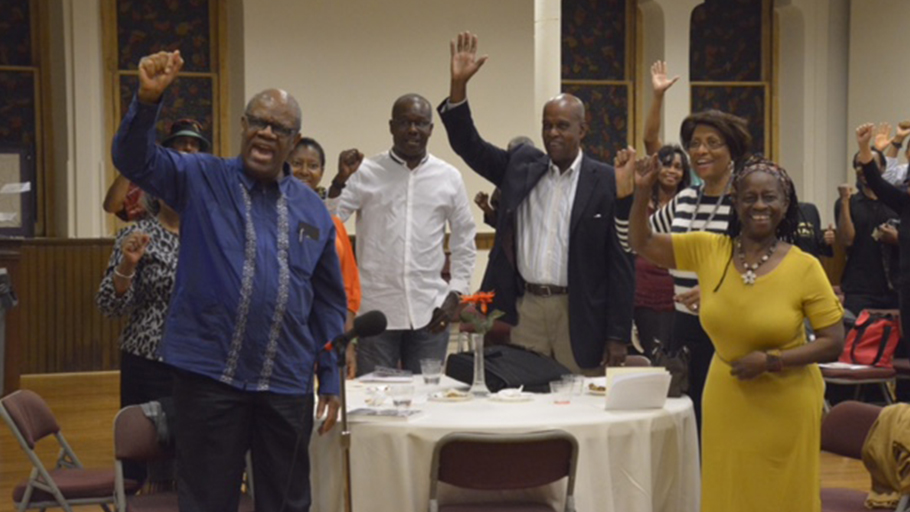
In submitting these demands the National African American Reparations Commission calls upon people of African descent to fully engage the struggle to achieve repair for the centuries of enslavement, legal and de facto segregation, systematic exclusion and violent and repressive policies and practices which have damaged Black families and communities across generations. We declare that the struggle for reparations is itself an integral part of the internal healing process which must occur as we strive to build just, humane and wholesome communities. By educating, mobilizing and organizing to win reparations, we create greater collective awareness of and honor the trials, tribulations, blood, suffering, sacrifice, survival, triumph and achievements of our ancestors. We are healed and made whole by being in communion with our ancestors and continuing the struggle for reparations and the liberation of people of African descent, Black people, in their name. The struggle continues!


